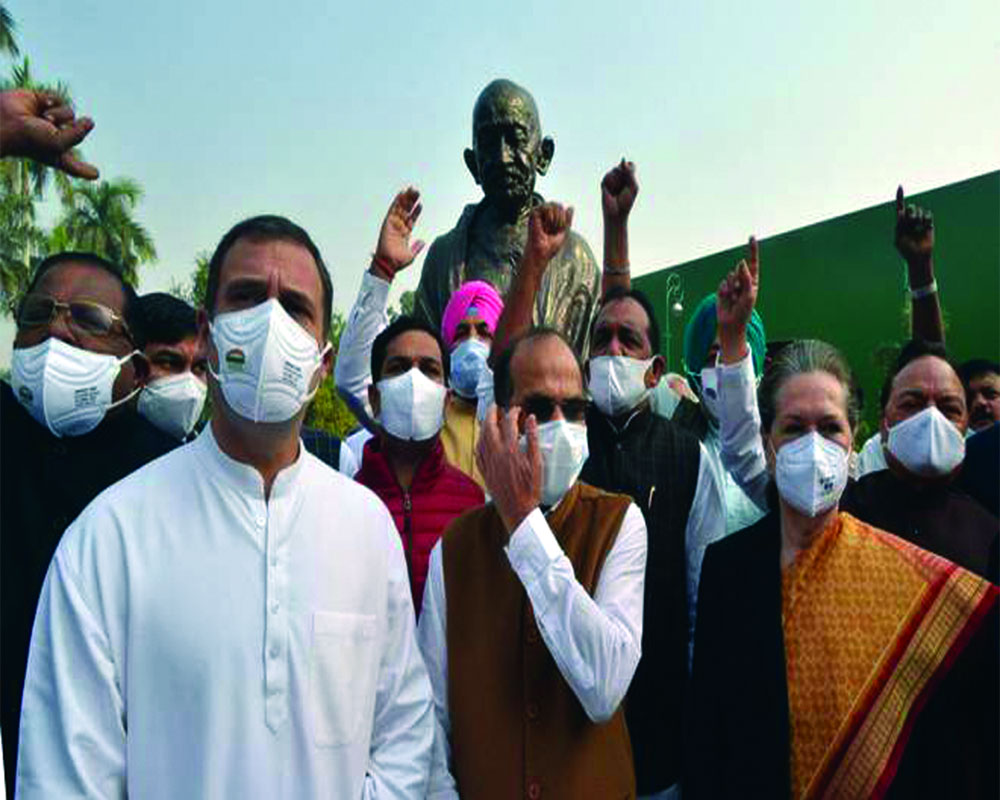Only a democrat can face the public as the Indian Prime Minister does on Mann ki Baat. Anyone can ask anything and embarrass the respondent
There were repeated mentions of the ‘murder of democracy’ on the opening day of Parliament. The cause was the suspension of 12 Rajya Sabha members by the Vice President of India presiding over the house. The behavior of some of the MP’s was extraordinary to put it politely. In my year in the Rajya Sabha, such a scheme was unthinkable; times obviously change. The repeal of the farm laws so soon was, to my mind, a new peak of democratic step. The Sanskrit saying kshama virasya bhushanam or forgiveness is the ornament of the valorous is to the effect. A variation of this wisdom would be ‘a gifted retreat behoves the generous king'. A mere politician could have suspended the laws and gone on to separate the farmers from the middlemen who feel threatened; but, in fact, were permitted to do what they liked; sell their produce to anyone overseas, including resorting to middlemen in the event of an emergency. How this is a murder of democracy, I do not know.
If the Opposition has any doubt with the democratic nature of the repealing of laws, let us glimpse at the track record of Prime Minister Modi. The abolition of the Planning Commission on the following day of his coming to power in 2014 was the big beginning. It was the control of national wealth which could be distributed at the will of the Central Government.
Every statement came up with a Plan and its budget. The Chief Minister came to annually call on the vice chairman of the Commission with a bouquet of flowers. No one asked questions except as a formality if the Centre was happy with the particular State. The two VIPs had a photograph taken with grins on their faces and the CM returned to his State.
The grant was money for jam. The responsibility for the implementation of the projects was that of the State Government. For example, one of the proposals of the State was to build a bridge for Rs 800 crore and it was granted. The CM and his side-kicks would have the foundation stone laying photographed for record. After that whether the State built the bridge or not was to be seen by the State. No one at the Centre needed to bother about that. On the other hand, the State could year after year debit in its annual plan the depreciation of say Rs 80 crore or ten per cent. In short, the Planning Commission amounted to a gifting body; what the State did with the gift was at its discretion as is a birthday present.
The Modi Government replaced the Planning distribution as well as the State sales tax with the Goods and Services Tax (GST) which the State independent of reliance on the Centre to distribute its annual doles. Every State was on its own and the Centre had no discretion. It is based on the merits of each State’s economy, production, service and so on. The Centre cannot deny anything to an Opposition ruled State or give more to its favourite State. Is that not very democratic compared to the previous arrangement? This is related to the main finances of a state.
I am alleging that everyone was corrupt but the scope at the State level was considerable. Take a Planning grant from the Centre and do not spend it. Equally, the scope for favourite was also substantial. Once in power at the Centre, a party could make a State the way it chose. I do not know whether Planning had any connection with the economic progress or its lack. But one thing is certain that no planned economy has reached the First World.
Only a democrat can face the public as the Prime Minister does on the Mann ki Baat programme. Anyone can ask anything and embarrass the respondent. The Opposition can have the mischief played; the respondent has to have a clan record and no skeletons in his cupboard. No previous Prime Minister has experimented with such an open public programme. The public, on the other hand, feels that the country’s top leader is accessible to them. He does not keep away from the common folk. This means that the PM is not their indirect representative but a direct one. This is how the Greek city democracy began and is the ultimate is freedom and people’s rule. This is unusual for a leader who carries the highest security risk in the country and perhaps is the world. He mingles with people when he campaigns in the elections. He spares no punches.
The Parliament is essential to remain in the limelight. To interrupt its proceedings is to cut one of the main branches the Parliament members occupy. Rushing into the well, in that sense, is suicidal for the Opposition. I realised that it is very necessary for the Opposition to protest as obviously as possible, but not to provoke its adjournment. The members can draw public attention by, for example, wearing black, whether masks, clothes or anything else. They can also sit in the aisles instead of their seats, and so on. But they should not lose floor time, which in today’s time, is televised. Another gain is avoiding the impression that MPs collect their pay but avoid work.
The writer is a well-known columnist, an author and a former member of the Rajya Sabha. The views expressed are personal.)


























